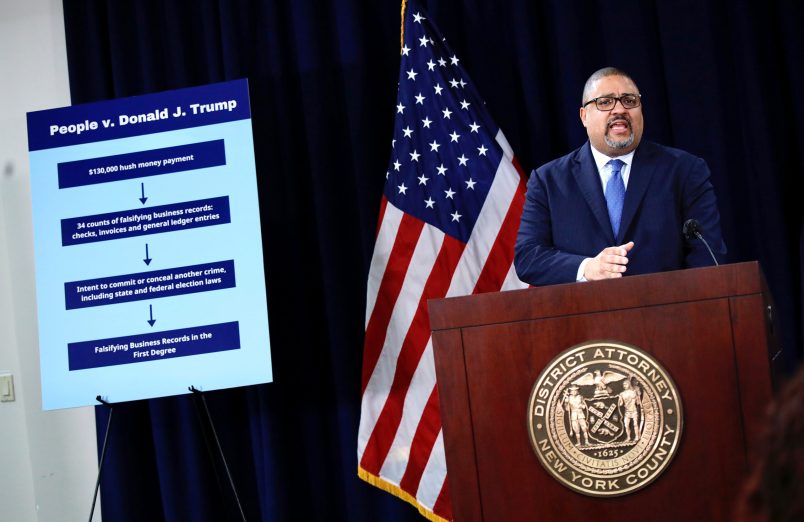Manhattan District Attorney Alvin Bragg asked a federal judge on Tuesday to block Rep. Jim Jordan (R-OH) from interfering in his case against President Trump.
Bragg sued Jordan in a 50-page complaint that seeks to block a series of subpoenas that Jordan and House Republicans had issued to Bragg and to current and former members of his office.
Jordan, head of the House Judiciary Committee and the subordinate House Weaponization Committee, has taken it upon himself to combine cable news theatrics with slavish devotion to Trump, trying to meddle in Bragg’s probe of Trump through a series of increasingly outrageous maneuvers.
These have included various subpoenas to Bragg and to Mark Pomerantz, a former prosecutor in the Manhattan DA’s office who wrote a tell-all about the Trump investigation before resigning. Next week, Jordan will bring the House GOP roadshow to Manhattan, holding a hearing of the Weaponization Committee outside of Bragg’s office which will double as a protest.
Bragg said in the lawsuit, filed in Manhattan federal court, that “rather than allowing the criminal process to proceed in the ordinary course, Chairman Jordan and the Committee are participating in a campaign of intimidation, retaliation, and obstruction.”
“Chairman Jordan and the Committee have, in essence, appointed Congress as a super grand jury that can flex its subpoena power to second guess the judgment of New York citizens and interfere with the state criminal justice process,” the lawsuit reads.
Bragg says that Congress, as the federal legislature, has no oversight authority over his activities as a state prosecutor.
It’s a straightforward claim, and comes after Republicans spent years ignoring attempts at oversight from the House when Democrats were in control under the Trump administration. During that period, Trump administration officials refused to comply at even a bare minimum level with dozens of subpoenas issued by Democrat-controlled panels, a striking break with past practice.
That obstruction led to a Supreme Court decision in the Mazars case, which redefined how courts decide whether congressional subpoenas are legitimate; Bragg cited that decision in his lawsuit against Jordan.
He declared the subpoena issued to Pomerantz “invalid, unenforceable, unconstitutional” in part because it “has no legitimate legislative purpose,” a callback to the argument used by Republicans to halt congressional investigations issued by House Democrats.
Jordan said in a statement that Bragg’s office had received federal dollars, which, he suggested, might allow a lever of congressional oversight.
“First, they indict a president for no crime,” Jordan said. “Then, they sue to block congressional oversight when we ask questions about the federal funds they say they used to do it.”
Jordan and the House Weaponization Committee’s focus on Bragg over the past month hasn’t only rubbed legal scholars and state-level Manhattan prosecutors the wrong way.
At least one MAGA pundit suggested on Monday that it’s a way for Jordan to avoid focusing on the much hairier issue of the DOJ and FBI’s ongoing dragnet of January 6 insurrectionists — an issue that lies squarely within congressional jurisdiction, as dubious as it might be to suggest that those investigations are somehow unjust.
Bragg suggested in the lawsuit that Jordan is working on Trump’s behalf, seeking to help the former President as he fights off the New York indictment. It’s an obstructive form of theater, the suit says.
“Mr. Trump is free to avail himself of any and all criminal procedure processes
available to him. Indeed, his motions in his criminal case are due in August. If he wishes to argue that his prosecution is ‘politically motivated,’ he is free to raise that concern to the New York state criminal court,” attorneys for Bragg wrote. “Chairman Jordan is not, however, free to unconstitutionally deploy Congress’s limited subpoena power for raw political retaliation, intimidation, or obstruction.”



